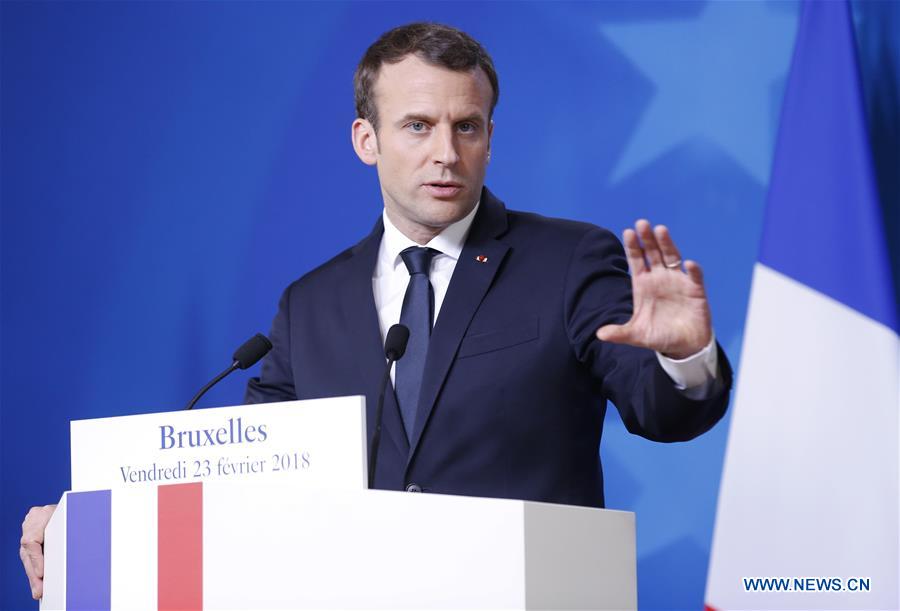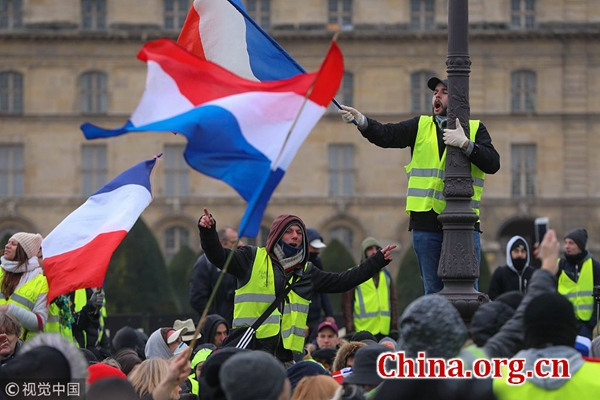Yellow vest movement may prove expensive for French President
- By Rachana Gupta
 0 Comment(s)
0 Comment(s) Print
Print E-mail China.org.cn, January 23, 2019
E-mail China.org.cn, January 23, 2019

In an open letter dated January 14 addressed to the people of France, President Emmanuel Macron launched a three-month-long national debate designed to assuage the yellow vest protesters that have brought extreme violence to the heart of Paris.
The 2,300-word letter came after the nine weeks of ceaseless anti-government protests by the commoners and marked an attempt by Macron to buy more time and establish control over the currently insurmountable problem rocking his government.
In it, he proposed that those upset with government economic policies, particularly those associated with the "gilets jaunes" or "yellow vest" movement – should participate in public debates that would be conducted in different cities across the country.
This debate, he said, would focus on four major themes: taxation, French governance, ecological issues, citizenship and democracy.
Making clear his determination to firmly stick to his campaign manifesto, he ruled out the possibility of making changes in the disputed business economic reforms including the scrapping of the plan to reduce wealth tax. This move, he stressed, was based on the fact that unusual high taxes drained corporate resources that could be used for investment and job creation.
Macron is hoping the "people's debate" can channelize public rage into finding a constructive solution, thereby creating a new national contract. This could impact the government's policy-making and strengthen France's position in regard to the European Union's future and other international issues.
In order to understand the nature of the ongoing protests, we need to delve deeper into the origin of the "yellow vest" movement – the name deriving from the high-visibility jackets that drivers in France must carry in their vehicles and wear during breakdowns and other emergencies.
The protesters chose this symbol to showcase their dire living condition and to make their contempt conspicuous against any perceived rise in living costs.
The movement first appeared when an online Facebook complaint – against rising fuel prices in May 2018 – posted by a woman owning an online cosmetic business went viral. The complaint attracted nearly a million signatures and eventually resulted in a mass demonstration on November 17, 2018.
The leaderless movement was stirred by ordinary people facing common economic and social challenges. The protesters are outraged not only over the issue of rising fuel prices, but also the increased cost of living and the government's tax reforms that they say imposes a disproportionate burden on middle- and lower-income groups.
The demonstrators have been demanding a significant tax cut to lower fuel prices, re-imposition of the solidarity wealth tax, increase in the minimum wage, giving a stronger role to creating people's referendums in determining policy-decisions, and, finally the President Macron's resignation.
It is obvious the latter's popularity has taken a huge beating since he came into power after a landslide win in the 2017 elections. Macron, during his campaign, had promised to improve people's lives by creating more jobs. However, his decision to reduce the wealth tax alienated many, who saw this change as a measure to benefit the elite class.
Additionally, Macron on several occasions had been detected making disdainful remarks about the common people, which acted as a catalyst to his already shrinking popularity and resulted in a label as a "President of the rich."
Earlier this month, the demonstrators sought wider public support through emptying their bank accounts to cause a gigantic run on the country's banking system. They hoped that this could potentially paralyze the financial industry and eventually provide them with the advantage in their anti-government battle.

Moreover, approximately 84,000 yellow vest protesters – including almost 7,000 in Paris – gathered on the streets for a 10th consecutive weekend in rejection of the presidential call for the "great debate." Almost 80,000 police forces were deployed across the country to re-establish control of the streets.
Considering the rapidly mushrooming unrest, the next big challenge for the French government is to get the proposed reform process underway as soon as possible.
This includes reforming the current pension law by changing the multiple pension system into a single one, along with replacing the existing pension calculation method. This might cut the pensions of some people, however.
Additionally, the government plans to limit family benefits below the inflation rate, toughen unemployment insurance eligibility criteria, and reduce the number of public sector employees.
These changes, however, could fuel even more public anger. Although there is no immediate threat to the continuity of Macron's presidency, the growing social unrest could block effective decision-making and limit the government's room for maneuver. Moreover, his deteriorating image and ensuing paralysis could give an edge to rival political parties (right and left wing) in the next presidential elections.
According to Ifop polls conducted from January 11 to 19, the President's approval rating has touched a new low, with almost 72 percent people disapproving of his presidency. Moreover, in a separate poll conducted by OpinionWay from January 17 to 18, almost 68 percent expressed their dissatisfaction of him.
Considering the skepticism expressed in these polls, Macron's recent strategic mistakes of making disparaging comments on commoners, and the unsparing bitterness of the masses, it seems that extinguishing the yellow vest movement will take more than just a national debate, and for the French government peace remains a distant dream.
Rachana Gupta is a China Focus columnist, an expert author of Ezine Articles and an active blogger and poetry writer.
Opinion articles reflect the views of their authors only, not necessarily those of China.org.cn.






Go to Forum >>0 Comment(s)